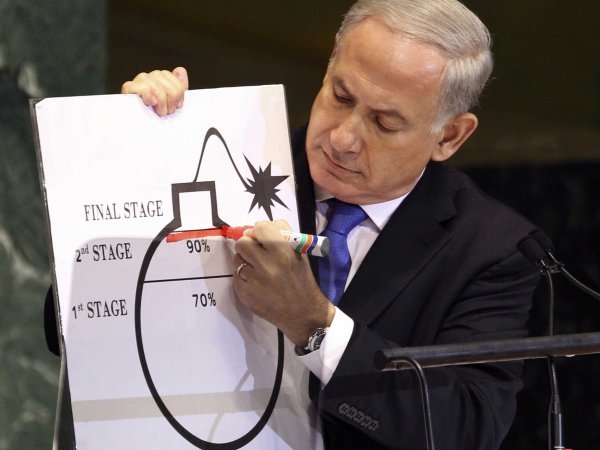The two leaders will seek to
mend their fractured relationship when they meet at the White House on
Monday, the first time they have talked face to face in more than a
year, the Guardian said.
Tensions
over the US-backed nuclear deal with Iran continue to strain ties
between the longtime allies. But there is also little hope of progress
on other matters, some Western media have said, with American officials
downplaying the chance of a breakthrough in security talks and ruling
out the prospect of a peace deal between Israelis and Palestinians
before Obama leaves office in 14 months.
"Obama has reached that conclusion that right now, barring a major shift, that the sides are not going to be in a position to negotiate a final status agreement,” White House Middle East adviser Rob Malley said before Bibi’s arrival in Washington.
This comes while Netanyahu has been the fiercest critic of the nuclear deal so far. It was in 2012 when Bibi brought a nuclear graphic to the United Nations General Assembly, warning that Iran was a few months away from building a nuclear bomb.

In April 2015, the Obama administration found a creative way to tweak Israeli Prime Minister Benjamin Netanyahu.
In a tweet from its official account on April 8, the White House posted a reference to Netanyahu's widely mocked 2012 UN speech.
In his address, the Israeli leader drew a red line on a cartoonish graphic of a bomb to warn against the possibility of the Islamic Republic getting a nuclear weapon.
The White House copied Netanyahu's bomb drawing and reshaped it to advocate for the US' initial agreement with Iran.
Even with the low expectations, the fact that the US and Israel leaders are meeting at all is seen as an important step. While the two leaders have long had a chilly relationship, tensions boiled over earlier this year amid Obama’s pursuit of the Iranian nuclear pact.
Netanyahu views Iran’s nuclear program as an existential threat to the Zionist regime and argued that the international agreement struck earlier this year leaves Tehran within reach of a bomb. The Israeli leader unsuccessfully lobbied United States lawmakers to oppose the deal, even delivering a rare speech to Congress that infuriated the White House.
Israeli PM Netanyahu had chilled out maybe because of threats by former Iranian president Mahmoud Ahmadinejad who had repeated that Israel should be wiped off the map.
However, Iran says that it does not intend to build a nuclear bomb. Supreme Leader of the Islamic Revolution Ayatollah Ali Khamenei has issued a religious verdict, called fatwa, announcing that the nuclear bomb and making it is "haram”, an Islamic term meaning strictly forbidden.
Iran says it has enough military power and otherwise deterrence not to need a nuclear bomb. On the same day, Monday, Tehran and Moscow signed a long-awaited deal according to which Moscow will deliver the S-300 missile system to Iran. Iran paid for the system in 2007, but Moscow has so far refrained from delivering it to Iran.
According to Sputnik, Moscow signed a contract with Iran on the delivery of S-300 missile defense systems and as soon as the first part of the contract is fulfilled, Iran will rescind its court case against Russia for non-delivery, the head of Russia's state technologies corporation Rostec stated Monday.
"The contract on delivery of S-300 to Iran has not only been signed by the sides but has already entered into force," Sergei Chemezov said at the Dubai Airshow-2015.
He added that as soon as the first part of the contract is fulfilled, then Tehran would rescind its court case against Moscow for the non-delivery of the system, basically due to economic sanctions that were in place against Tehran.
Chemezov didn't elaborate exactly which variations of the S-300 missile defense systems will be supplied to Iran.
Russia and Iran signed an $800-million deal for the delivery of five S-300 missile systems in 2007. In 2011, Iran sued Russia in the Geneva Arbitration Court after Moscow suspended the contract in 2010, citing a UN Security Council resolution that placed an arms embargo on Tehran.
Vladimir Putin, the Russian President lifted the S-300 delivery ban in April 2015, shortly after the group 5+1 (the US, UK, France, Russia, China, and Germany) and Iran reached a framework nuclear agreement to remove all economic sanctions against Tehran in exchange for its pledge to ensure that all nuclear research in the country will be for peaceful purposes.
Between the two leaders, Obama looks like the more realist, however. The first reason for believing so is that he is the one American leader who has managed to take the nuclear dispute somewhere. After all, former Iranian and US presidents failed to come to terms, or at least anywhere near so, in long years.
The second reason, and what seems to regard domestic US policy, is that Obama, through the deal, has secured a public favor for his party for the next round of presidential elections. He is going to leave the White House in a litter over one year.
"At the risk of overgeneralizing,” he writes, "one can say that idealists worry most about courage, realists about constraints; idealists focus on the benefits of resisting evil with force, realists on the costs.” On the whole, "realists recommend humility rather than hubris,” E.J. Dionne wrote in the Washington Post recently.
The meeting between Obama and Netanyahu seems, therefore to be one between realism and shear fright at unbridled imagination. Netanyahu seems very lonely in maintaining that the post-JCPOA Iran will be a threat to the world, his idea having been rejected by six world powers as well as the whole European Union.